In April 2024, Flanders launched its ambitious Green Deal ‘Shared Mobility and Living’ (Deelmobiliteit en Wonen). The goal of this initiative is to mainstream shared mobility in residential areas. For three years, local governments, housing developers, shared mobility providers and other stakeholders take action to integrate shared mobility in residential areas.
The four Flemish SHARE-North Squared project partners play a pivotal role in implementing the Green Deal’s ambitions! In this longread, you will learn more about the Green Deal and how Way To Go, Mpact, the City of Mechelen and Woonland social housing contribute to it.
The Green Deal in a nutshell
The Green Deal 'Shared Mobility and Living' is signed by over 90 organisations, including mobility providers, housing developers, healthcare facilities, universities, cities, study & consulting offices, several departments of the Flemish administration, as well as NGOs. Way To Go, Mpact, the City of Mechelen and Woonland social housing, the four Flemish SN² partners, all signed the Green Deal and contribute to materialising its ambitions!
The 90+ signatories of the Green Deal take action at the level of their organisation and participate in working groups. During the first year of the Green Deal, working groups focused on (1) inclusive car sharing, (2) cooperation between stakeholders to integrate shared mobility in new residential areas, and (3) tools for (local) governments. This year, the focus is on (1) developing shared mobility tendering guidelines for (local) governments, (2) social tariffs for vehicle sharing, and (3) replacement ratios of private by shared cars.
Way To Go coordinates this Green Deal and hence plays a pivotal role in it. They develop a strategy to structurally embed shared mobility into housing developments in Flanders and cooperate with the Green Deal signatories to take hurdles away. Mpact is developing Cozywheels peer-to-peer vehicle sharing further, with an emphasis on vehicle sharing in cohousing residences. In the City of Mechelen, the urban administration and Woonland social housing are making car sharing in (social) housing projects possible.
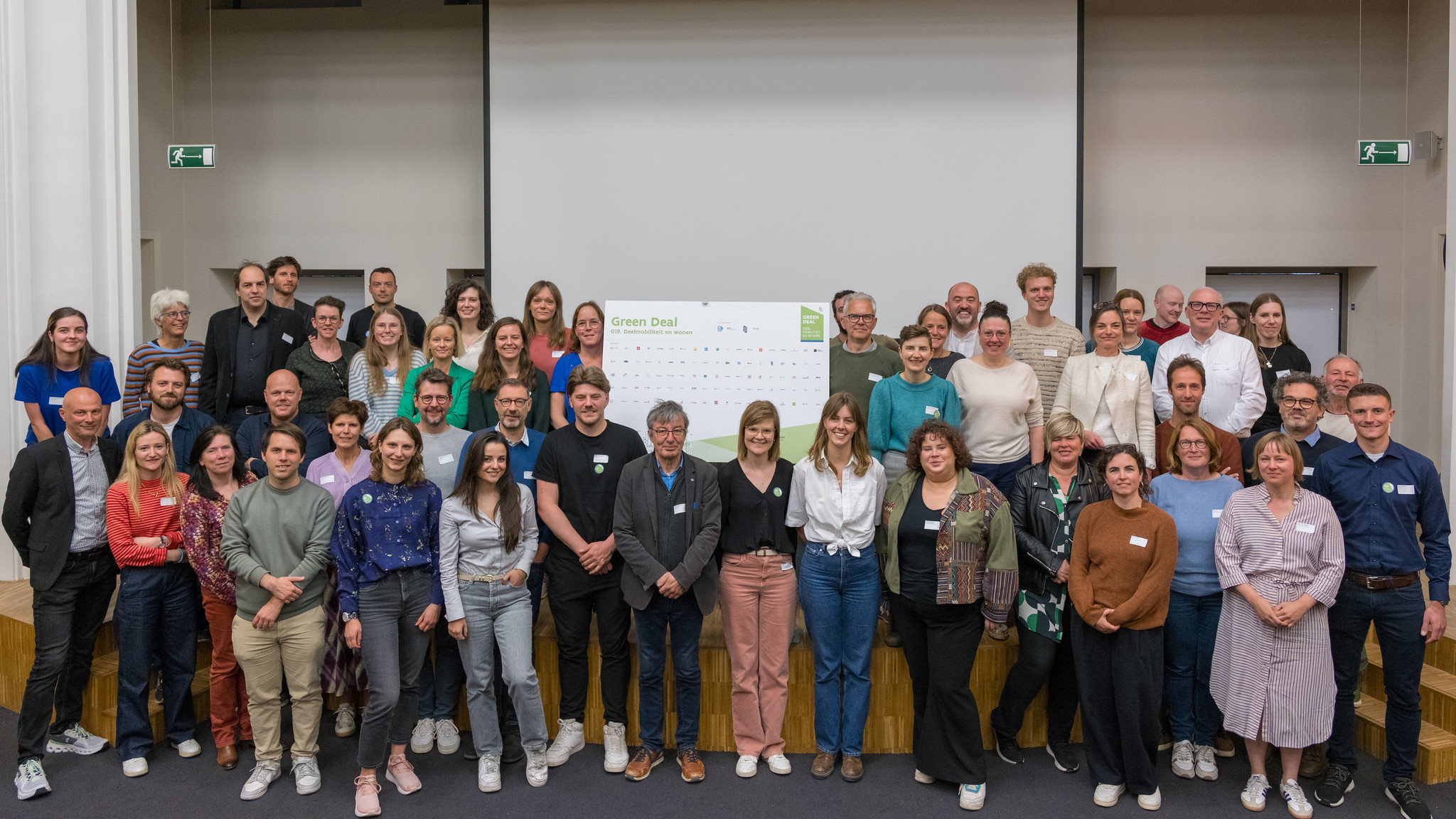
The signatories of the Flemish Green Deal 'Shared Mobility and Living' (copyright: Way To Go).
From theory to practice
The aforementioned working groups develop hands-on tools to facilitate the integration of shared mobility into residential neighbourhoods.
Targetting housing developers, the Green Deal developeda checklist for integrating shared mobility in housing projects. Step-by-step, the document describes everything to take into account when adding shared mobility into (social) housing developments. The checklist was created together with real estate companies to make sure that the recommendations are realistic. As the 'housing' and 'mobility' are in still rather separated networks, the checklist also includes an overview of the contact details of the shared mobility providers in Flanders. This helps in bridging the gap between both worlds.
The Flemish Green Deal partners also launched a brochure with 22 recommendations on how to make car sharing more inclusive. These were developed in the aforementioned working groups. It gives practical advice to local governments on how the shared mobility offer can be made as accessible as possible, how to develop an inclusive shared mobility policies and how to communicate inclusively. For each recommendation, the brochure provides a series of best practices.
A lot of work is of course taking place behind the scenes, especially regarding the policy frameworks. Way To Go is currently making an overview of all legal instruments related to implementing shared mobility in new housing constructions, like contracts and ordonnances. These technical documents will be translated into a decision making tree that will be available by the end of the Green Deal program.
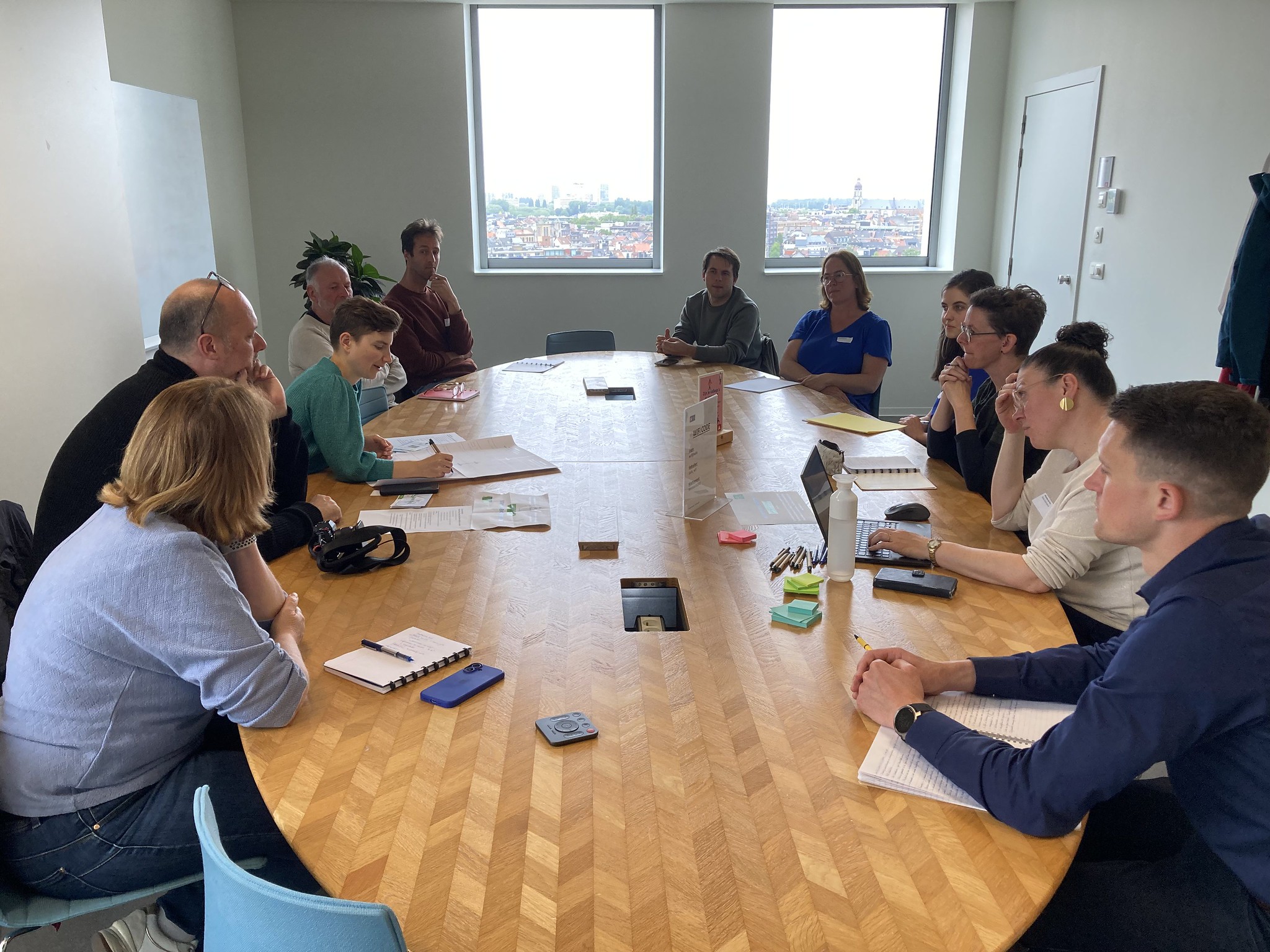
Esther De Reys (Way To Go) leading one of the Green Deal workshops with stakeholders (copyright: Way To Go).
Things are moving in Mechelen!
Among the signatories of the Green Deal, we find numerous Flemish cities. Mechelen, a SHARE-North Squared project partner, is undoubtedly a front runner when it comes to linking shared mobility to housing projects.
Esther De Reys from Way To Go believes that the case of Mechelen has a lot of replication potential for the rest of Flanders:
“I see three interesting elements in Mechelen’s vision on shared mobility and living. Firstly, their parking ordinance makes it possible for real estate developers to build fewer parking spots, under the condition that they provide a financial contribution to cover the cost of a shared car. This is in the advantage of the housing developer as it costs them less than building expensive (underground) parking facilities.
Secondly, there has to be agreement between the City of Mechelen and the real estate developer so that the city maintains control over the shared vehicle. This is in the interest of the real estate company as well, as they can keep on focusing on their core business – building houses, not managing vehicles.
Thirdly, regarding the location of the shared vehicles, the ordinance prioritises installing the shared vehicle in the public domain, provided that this practically feasible. If this is not possible, then the vehicles can be placed at the private domain. By installing the shared cars on the public domain, not only the residents of the housing complex but also people living nearby can make use of the vehicle. This is in the interest of the car sharing provider as it guarantees a higher usage of the car, and thus higher revenues.”
The case of Mechelen has a lot of replication potential for the rest of Flanders.
If you want to learn more about Mechelen, we can warmly recommend you our article on Mechelen’s Urban Planning Regulations as well as our interview with the experts from Woonland social housing.
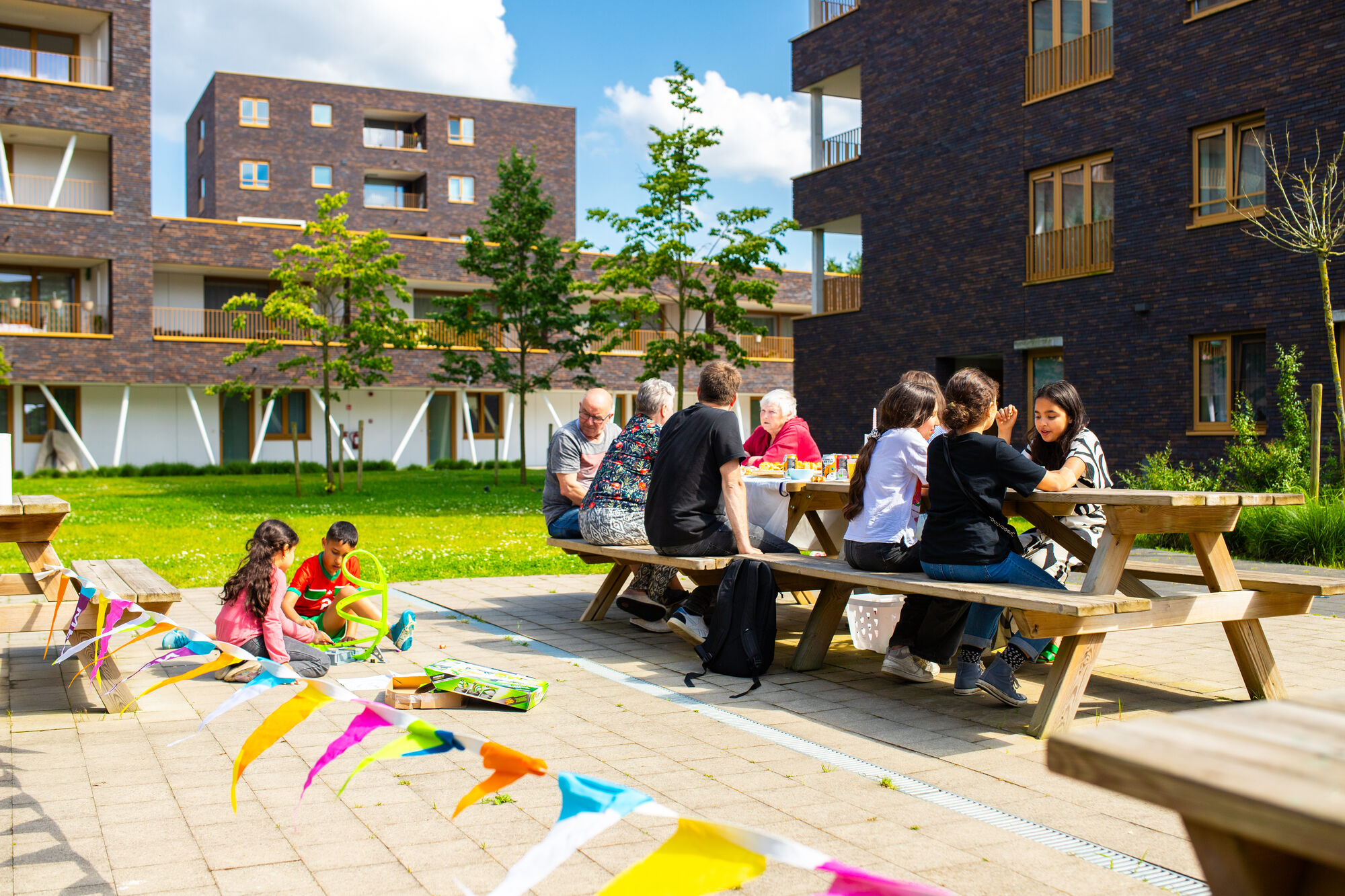
The Ghandi residential neighbourhood in Mechelen, one of the SN² pilot projects (copyright: Stad Mechelen).
SN² in action!
Next to the City of Mechelen and Woonland social housing, SN² partners Way To Go and Mpact are actively implementing the Green Deal’s goals on the terrain.
Way To Go
As mentioned before, Way To Go coordinates the Flemish Green Deal ‘Shared Mobility and Living’, organises meetings between stakeholders, and creates tools like the aforementioned checklist.
Way To Go is also very active on the field. A concrete example of this stems from the Patershof sustainable housing project in the City of Sint-Niklaas, another Green Deal signatory. The project includes 22 housing units and does not have parking spaces for private cars, but it does provide space for car sharing.
Before installing the cars, Way To Go organised a 'needs assessment' among the future residents of this housing project. Based on this analysis, Way To Go could suggest a car sharing offer that suited the needs of the residents. Next, Way To Go promoted the shared vehicles through a network of ambassadors, and distributed leaflets. These are relevant and necessary actions because shared mobility is a new concept to the majority of the residents.
To end this trajectory with the Patershof residents, there will be an official launch event for the shared cars in September - so stay tuned!
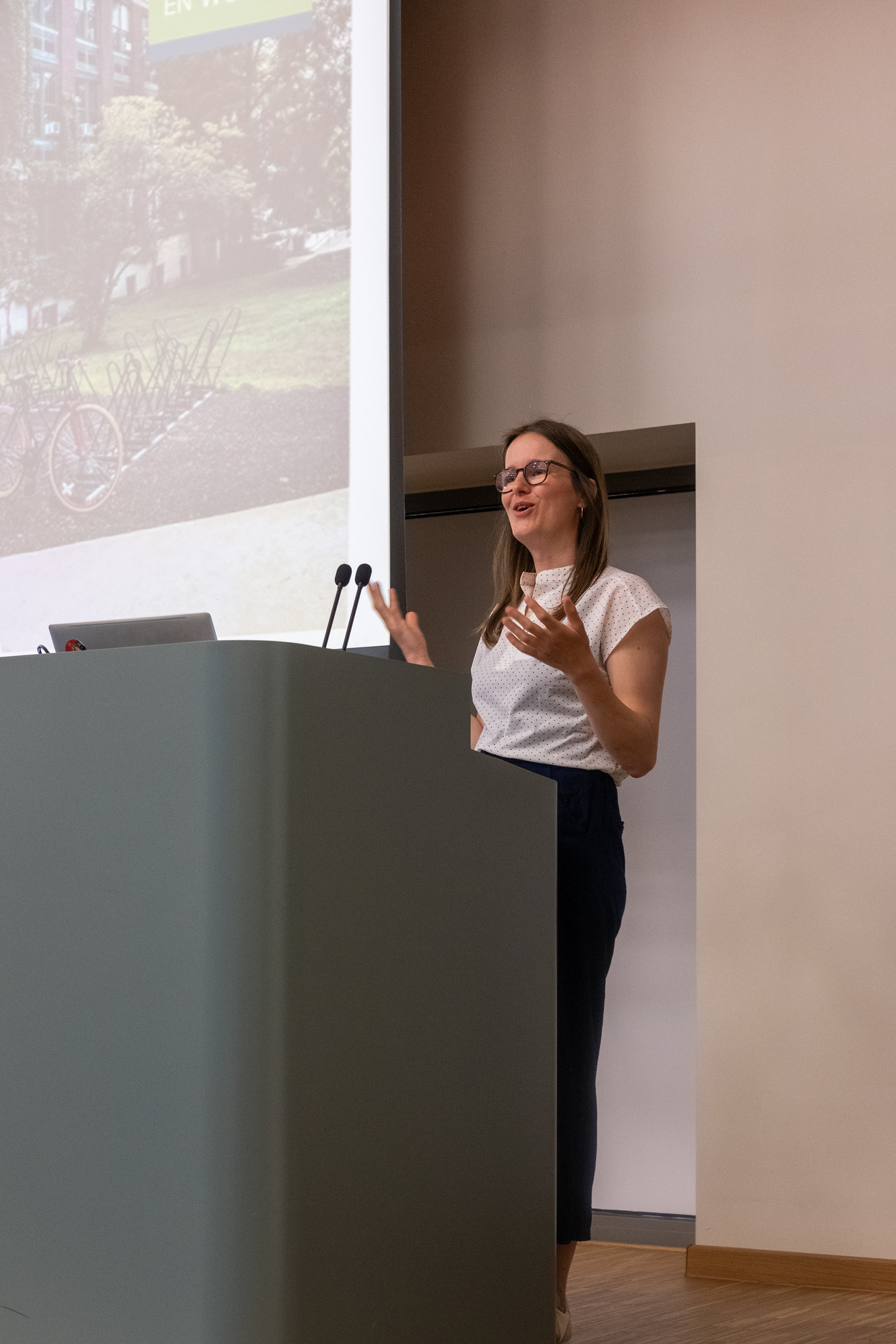
Merel Vansevenant (Way To Go) introducing the Green Deal 'Deelmobiliteit and Wonen' during one of the signatories' meetings (copyright: Way To Go).
Cozywheels by Mpact
Cozywheels, Mpact’s platform for vehicle sharing between neighbours, is also involved in the Flemish Green Deal.
Firstly, Cozywheels focuses on sharing adapted vehicles between neighbours or organisations. The platform has gained many insights from an earlier project with the City of Bruges: Tope Riejn, through which Bruges offers 25 adapted bikes via Cozywheels. The learnings from this project are used to adapt the platform, and new pilots are launched in the Flemish cities of Dendermonde and Izegem.
Cozywheels is also increasingly focusing on cohousing residences. “People living in cohousing projects have clearly embraced the sharing logic”, explains Eva Missinne from Mpact, the organisation running Cozywheels:
“We observe that vehicle owners are open to sharing their cars or bikes, but often only with people they know.
Cozywheels works with closed groups and therefore offers the perfect solution for cohousing projects. The residents can reserve the vehicle via the online platform and receive an invoice based on actual usage.
Cozywheels is not just a mobility solution: it stimulates social exchanges between the neighbours as well”.
The number of cohousing groups affiliated to Cozywheels is increasing. As a part of the Green Deal, Mpact is collecting in-depth feedback from their cohousing partners. This helps to tailor the platform further to the needs of cohousing groups and develop communication packages.
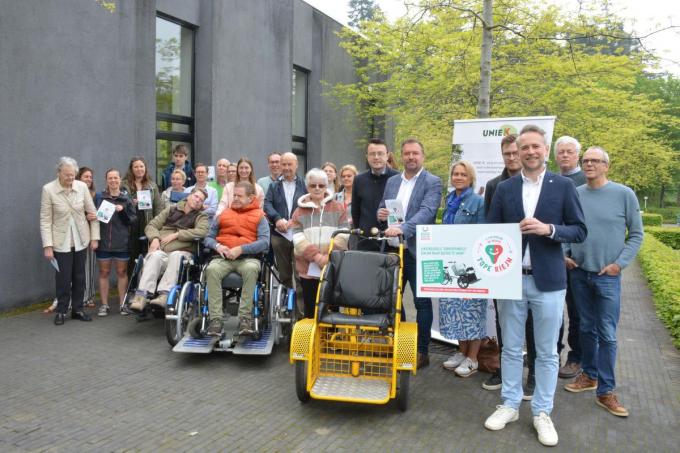
The City of Bruges and Mpact teamed-up for the 'Tope Riejn' project, unlocking a network of adapted shared bikes (copyright: Krant van West-Vlaanderen).
Follow our work!
The Green Deal ‘Shared Mobility and Living’ wants to make car and bike sharing in residential areas a no-brainer by 2027. You can follow the actions of the Green Deal signatories via the official website.
The Green Deal ‘Shared Mobility and Living' (Deelmobiliteit en Wonen) is an initiative from the following organisations: Way To Go, Beroepsvereniging voor de Vastgoedsector, Netwerk Duurzame Mobiliteit, Vlaamse Vereniging voor Steden en Gemeenten.
It is supported by the Flemish Department of Environment.
Credits
Text written by Jelten Baguet (Mpact)
With contributions from Esther De Reys, Merel Vansevenant (both Way To Go) and Eva Missinne (Mpact)
Pictures by Way To Go, Mpact and Stad Mechelen
